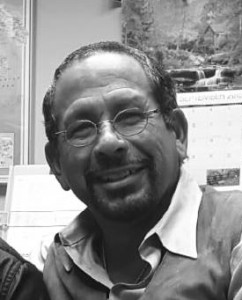Dr. Marc Smith, a Sinclair faculty member, who fell in love with science at a young age, which motivated him to get his Master’s in Biology.
Why he’s interesting…
Growing up in rural Painesville, Ohio in the late 1950s and early 60s, Dr. Smith said he often played outside with his neighborhood friends for entertainment. From a young age, he said he was fascinated by what he found in nature—whether it was looking for crawdads in the nearby creek or watching a caterpillar go through metamorphosis to become a beautiful butterfly.
His parents supported him through it all. Along the way his mom would always wash his muddy clothes and his dad would teach him things about the outdoors—his father was an avid fisherman. Smith said as he got older, he became more interested in science, which guided him in the decision of starting a career in Biology.
Dr. Smith entered the United States Air Force after high school and after eight years, he retrained into Cytotechnology in the Pathology Department of the Hospital Laboratory. From there, he decided to pursue pre-medical studies at Wright State University. At 33 years old, he completed his studies, and in 1988, he received an interview for medical school at Michigan State University, but chose not to seek a medical degree because of his “old” age.
“Don’t make the mistake of thinking that it’s too late to do what you want to do—you’re never too old,” Smith said.
Upon his retirement from the Air Force after 20 years of active duty, he was asked to visit Dr. Herman Brandt (former Dean of Allied Health Division), who recommended Smith as a candidate in Sinclair’s Grow Our Own (GOO) Program. The program was created by Dr. David Ponitz (second SCC President) and Dr. Ned Sifferlen (then Provost, and third SCC President) in 1991 to diversify the Sinclair faculty. In 1992, Smith took advantage of the opportunity and began to teach biology at Sinclair and concurrently earned his Master’s Degree in Biology from Wright State University in 1995. Immediately, Dr. Ponitz and Dr. Sifferlin encouraged him to get his Ph.D., and in 2006 he completed his degree in Higher Educational Leadership.
Smith is very involved in the Sinclair Biology Department; he frequently edits biology textbooks, as well as Sinclair’s own General Biology lab books. He said his favorite field of biology is ecology, although he realizes the importance of all the sciences.
One of the reasons Ecology is so fascinating to him is because it is “so relevant.”
“The Earth has a finite amount of resources that are being overly exploited every single day—where do we go if and when we can no longer live here on the Earth,” Smith said.
Conservation is paramount to Smith, and he said he would certainly be happy to discuss that with anyone should they have questions or thoughts.
His favorite part of teaching is the delayed gratification in seeing students go through an entire semester, sometimes struggling, and emerging at the end of the course with a sense of confidence.
“Indeed, they can overcome the challenges of collegiate coursework while simultaneously learning invaluable course content,” Smith said.
He said it takes great strides to constantly encourage and assist his students, but he takes great pleasure in “helping students realize and maximize their potential educational opportunities in order to become the productive citizens demanded in this New Age Economy.”
Alex Kennedy
Reporter


